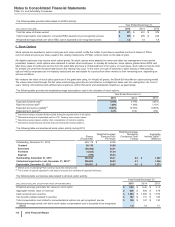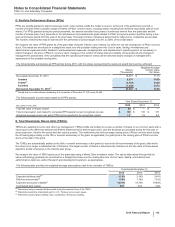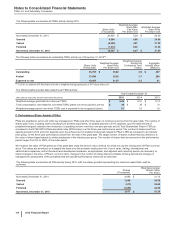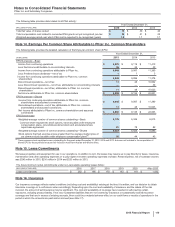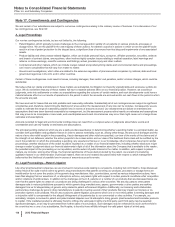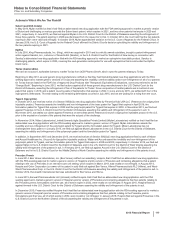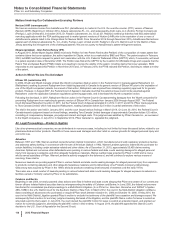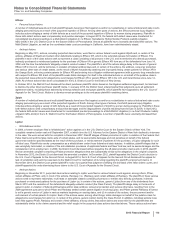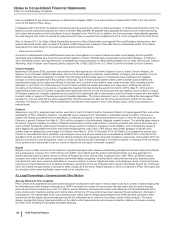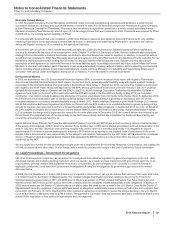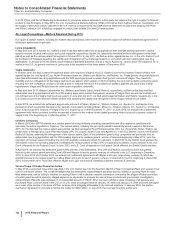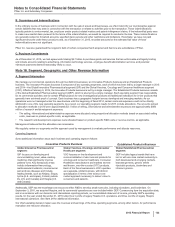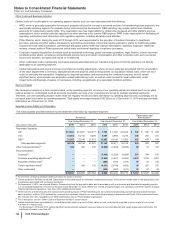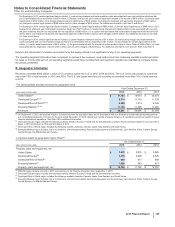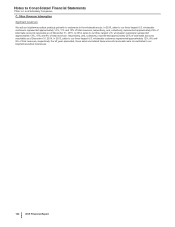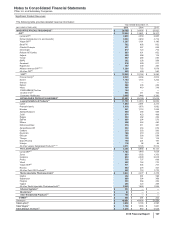Pfizer 2015 Annual Report Download - page 123
Download and view the complete annual report
Please find page 123 of the 2015 Pfizer annual report below. You can navigate through the pages in the report by either clicking on the pages listed below, or by using the keyword search tool below to find specific information within the annual report.
Notes to Consolidated Financial Statements
Pfizer Inc. and Subsidiary Companies
122
2015 Financial Report
In 2012, Pfizer sold the UK Marketing Authorisation for phenytoin sodium capsules to a third party, but retained the right to supply the finished
product to that third party. In May 2013, the U.K. Competition & Markets Authority (CMA) informed us that it had launched an investigation into
the supply of phenytoin sodium capsules in the U.K. market. In August 2015, the CMA issued a Statement of Objections alleging that Pfizer
and Pfizer Limited, a U.K. subsidiary, engaged in conduct that violates U.K. and EU antitrust laws.
A5. Legal Proceedings––Matters Resolved During 2015
During 2015, certain matters, including the matters discussed below, were resolved or were the subject of definitive settlement agreements or
settlement agreements-in-principle.
Lyrica (pregabalin)
In May and June 2011, Apotex Inc. notified us that it had filed abbreviated new drug applications with the FDA seeking approval to market
generic versions of Lyrica oral solution and Lyrica capsules, respectively. Apotex Inc. asserts the invalidity and non-infringement of the basic
patent, as well as the seizure patent that expired in October 2013. In July 2011, we filed an action against Apotex Inc. in the U.S. District Court
for the District of Delaware asserting the validity and infringement of the challenged patents in connection with both abbreviated new drug
applications. In January 2015, the District Court entered a stipulated dismissal, and as a result, Apotex Inc. cannot obtain FDA approval for, or
market in the U.S., its generic versions of Lyrica prior to the expiration of the basic patent in December 2018.
Viagra (sildenafil)
In October 2010, we filed a patent-infringement action with respect to Viagra in the U.S. District Court for the Southern District of New York
against Apotex Inc. and Apotex Corp., Mylan Pharmaceuticals Inc. (Mylan) and Mylan Inc. and Actavis, Inc. These generic drug manufacturers
have filed abbreviated new drug applications with the FDA seeking approval to market their generic versions of Viagra. They assert the
invalidity and non-infringement of the Viagra method-of-use patent, which expires in 2020 (including the six-month pediatric exclusivity period
resulting from the Company’s conduct of clinical studies to evaluate Revatio in the treatment of pediatric patients with pulmonary arterial
hypertension; Viagra and Revatio have the same active ingredient, sildenafil).
In May and June 2011, Watson Laboratories Inc. (Watson) and Hetero Labs Limited (Hetero), respectively, notified us that they had filed
abbreviated new drug applications with the FDA seeking approval to market their generic versions of Viagra. Each asserts the invalidity and
non-infringement of the Viagra method-of-use patent. In June and July 2011, we filed actions against Watson and Hetero, respectively, in the
U.S. District Court for the Southern District of New York asserting the validity and infringement of the Viagra method-of-use patent.
In April 2015, we entered into settlement agreements with each of Mylan, Mylan Inc., Watson, Actavis, Inc., Apotex Inc. and Apotex Corp.
pursuant to which we granted licenses to the method-of-use patent permitting Mylan, Mylan Inc., Watson, Actavis, Inc., Apotex Inc. and Apotex
Corp. to launch generic versions of Viagra in the U.S. beginning on or after December 11, 2017. In June 2015, we entered into a settlement
agreement with Hetero pursuant to which we granted a license to the method-of-use patent permitting Hetero to launch a generic version of
Viagra in the U.S. beginning on or after December 11, 2017.
Celebrex (celecoxib)
In March 2013, the USPTO granted us a reissue patent covering methods of treating osteoarthritis and other approved conditions with
celecoxib, the active ingredient in Celebrex. The reissue patent, including the six-month pediatric exclusivity period, expired in December
2015. On the date that the reissue patent was granted, we filed suit against Teva Pharmaceuticals USA, Inc. (Teva USA), Mylan, Watson (as
predecessor to Allergan plc), Lupin Pharmaceuticals USA, Inc. (Lupin), Apotex Corp. and Apotex Inc. in the U.S. District Court for the Eastern
District of Virginia, asserting the infringement of the reissue patent. Each of the defendant generic drug companies had previously filed an
abbreviated new drug application with the FDA seeking approval to market a generic version of celecoxib beginning in May 2014, upon the
expiration of the basic patent (including the six-month pediatric exclusivity period) for celecoxib. In March 2014, the District Court granted the
defendants’ motion for summary judgment, invalidating the reissue patent. In May 2014, we appealed the District Court’s decision to the U.S.
Court of Appeals for the Federal Circuit. In June 2015, the U.S. Court of Appeals for the Federal Circuit affirmed the District Court’s decision.
In April 2014, we entered into settlement agreements with two of the defendants, Teva USA and Watson, pursuant to which we granted
licenses to the reissue patent permitting Teva USA and Watson to launch generic versions of celecoxib in the U.S. beginning in December
2014. In June 2014 and October 2014, we entered into settlement agreements with Mylan and Lupin, respectively, pursuant to which we
granted licenses to the reissue patent permitting Mylan and Lupin to launch generic versions of celecoxib in the U.S. beginning in December
2014. In December 2014, Teva USA, Watson, Mylan and Lupin commenced marketing of generic versions of celecoxib.
Various Drugs: Off-Label Promotion Action
In May 2010, a purported class action was filed in the U.S. District Court for the Southern District of New York against Pfizer and several of our
current and former officers. The complaint alleges that the defendants violated federal securities laws by making or causing Pfizer to make
false statements, and by failing to disclose or causing Pfizer to fail to disclose material information concerning the alleged off-label promotion
of certain pharmaceutical products, alleged payments to physicians to promote the sale of those products and government investigations
related thereto. Plaintiffs seek damages in an unspecified amount. In March 2012, the court certified a class consisting of all persons who
purchased Pfizer common stock in the U.S. or on U.S. stock exchanges between January 19, 2006 and January 23, 2009 and were damaged
as a result of the decline in the price of Pfizer common stock allegedly attributable to the claimed violations. In January 2015, the parties
reached an agreement in principle to resolve the matter for $400 million. In July 2015, the court approved the settlement.


